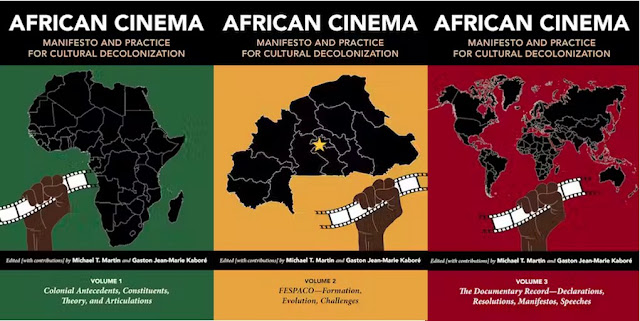
Indiana University Press
Edited by Michael T. Martin and Gaston Jean-Marie Kaboré
With Allison J. Brown, Cole Nelson and Joseph E. Roskos
Challenging established views and assumptions about traditions and practices of filmmaking in the African diaspora, this three-volume set offers readers a researched critique on black film.
Volume 1: Colonial Antecedents, Constituents, Theory, and Articulations
https://iupress.org/9780253066213/african-cinema-manifesto-and-practice-for-cultural-decolonization/
Volume One of this landmark series on African cinema draws together foundational scholarship on its history and evolution. Beginning with the ideological project of colonial film to legitimize the economic exploitation and cultural hegemony of the African continent during imperial rule to its counter-historical formation and theorization. It comprises essays by film scholars and filmmakers alike, among them Roy Armes, Med Hondo, Fèrid Boughedir, Haile Gerima, Oliver Barlet, Teshome Gabriel, and David Murphy, including three distinct dossiers: a timeline of key dates in the history of African cinema; a comprehensive chronicle and account of the contributions by African women in cinema; and a homage and overview of Ousmane Sembène, the "Father" of African cinema.
Contributions by Roy Armes, Femi Okiremuete Shaka, James Burns, Tom Rice, Odile Goerg, Med Hondo, Férid Boughedir, Haile Gerima, Sada Niang, Monique Mbeka Phoba, Olivier Barlet, Clyde R. Taylor, Férid Boughedir, Alexie Tcheuyap, Esiaba Irobi, Stephen A. Zacks, Teshome H. Gabriel, David Murphy, Jude Akudinobi, Maureen N. Eke, Paulin Soumanou Vieyra, Boukary Sawadogo, Claude Forest, Samba Gadjigo and Beti Ellerson
https://iupress.org/9780253066251/african-cinema-manifesto-and-practice-for-cultural-decolonization/
This volume features historically significant and commissioned essays, commentaries, conversations, dossiers, and programmatic statements and manifestos that mark and elaborate the key moments in the evolution of FESPACO over the span of the past five decades.
https://iupress.org/9780253066299/african-cinema-manifesto-and-practice-for-cultural-decolonization/




No comments:
Post a Comment
Relevant comments are welcome - Les discussions constructives sont les bienvenues